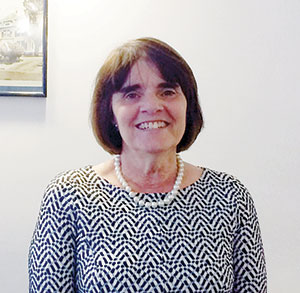
The standing District of Attorney of Middlesex County, Marian T. Ryan. — Photo by Jeremy van der Heiden
By Jeremy F. van der Heiden
This is the second part of a three-part series for The Somerville Times interview with Middlesex County District Attorney Marian T. Ryan.
In the first part of our interview with Middlesex County District Attorney Marian T. Ryan, we discussed the path she took to reach her current position, as well as some of the challenges that are facing Somerville.
Now, we will go into the complexities that Middlesex County – the 23rd most populous county in the nation and first most populous in New England – faces as a whole, as well as the state of the prison system.
__________________________________________________________________
The Somerville Times: Which areas – whether parts of the judicial system and law enforcement or specific cities and town – of Middlesex County do you feel need the most help to get to where they need to be?
D.A. Ryan: I think that it depends on what you’re talking about with where we want to get to. You know, one of the things I love about Middlesex County, I always say, is it really is like a social laboratory. At 54 cities and towns, they are incredibly different, and many of them need different things.
You look at one place that is an inner city like a Malden or Everett and say ‘the kids here need this, this or that to go forward.’ I can look at the western part of the county like Groton and Dunstable … and kids have real needs there and, they’re very different needs, but no less impactful to kids … I don’t know if there is a uniform piece to that, you know there are problems that we see across the board, things like addiction and domestic violence that you see everywhere. Various faces, but they are everywhere.
I don’t think we have a perfect city or town. There are different challenges in different places.
__________________________________________________________________
The conversation then moved toward the prison system, which has been a central topic in discussions ranging from human rights advocacy groups to Congress and beyond. Earlier in July, U.S. Attorney for the Western District of Virginia Timothy Heaphy, speaking at a House Judiciary committee, announced that the United States has five to 10 times the prison population rate per capita of most democracies.
The Somerville Times asked D.A. Ryan to provide her insights on this prison system.
__________________________________________________________________
TST: Do you believe that the prison system, let’s say in Middlesex County, is broken, or the state, or the nation?
D.A.R: I know that there’s a lot of talk about that, particularly comparing us to other states, and I don’t know what people are comparing and how that all fits.
Obviously prisons are not a part of society that has a big constituency. An effective prison system should, for instance, prepare those people who are going back into society to get back, it should provide programs, and that means money.
And you know, there are a lot more people at the state house looking for money for school than there are looking for money for the prisons. It’s no secret that the entire law enforcement and judicial piece of our budget is lagging far behind, it’s one of the reasons why I’ve taken a real leadership role in terms of salaries for my D.A.’s and things like that.
Unless you are unfortunate enough to be a victim or to have somebody or yourself who is a defendant, who is really interested in that issue?
“My kid wants an art program in their school” versus “we should put a graduate program in our prisons,” you know where people are going to be voting on that.
Is it something – like the rest of the judicial system – that suffers from lack of resources? Yes, it is.
STS: Have you seen any repercussions from the state’s closure of mental health institutions in the courts?
D.A.R: Good mental health is something that we do not have enough of – good mental health services. I was the chief of the Elderly and Disabled Unit and there are lot of people ranging from kids to senior citizens who have mental health issues that we don’t have the money to address, or we don’t spend the money to address.
The whole idea that began 15 years ago or so of deinstitutionalizing people with mental health issues … the whole idea was that these people would be in the community and good mental health services would available, and that has not really worked out that well.
So we have a lot of people out of institutions and in the communities, finding themselves in trouble as a defendant or being victimized, I’ve seen both side of that and it really goes to their mental health.
We have a lot of kids that are not getting the mental health services they need, we have a lot of seniors – particularly – who aren’t getting the mental health services they need and, again, it’s money.
__________________________________________________________________
The interview continued on to the war on drugs, especially how it ties into the state of the prison system, which is where the third part of this series will begin.
In the final part of this series, to be published next week, we will also discuss D.A. Ryan’s thoughts for the future and what separates her from the competition in the forthcoming election.















Reader Comments